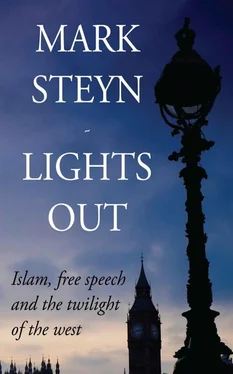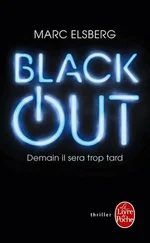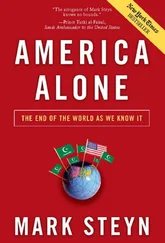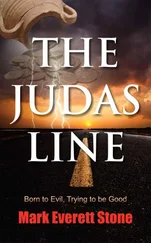We scoffers were only half-right. In the Arab world, the “shocking exposé of torture” was shocking not because it was torture but because it exposed something worse. “Most Muslims did not view it as a torture story at all,” writes D’Souza. “Abu Ghraib was one of Saddam Hussein’s most notorious prisons. Tens of thousands of people were held there and many were subject to indescribable beatings and abuse. Twice a week, there were hangings outside the prison. This is what Muslims mean by torture, not the lights-on, lights-off version that American liberals are so indignant about… The main focus of Islamic disgust was what Muslims perceived as extreme sexual perversion.” Saddam’s guards pulling out your fingernails is torture. But a nobody like Lynndie England, a female soldier and adulteress, boozed up and knocked up and posing naked for photographs with paralytic casual acquaintances and making men masturbate in front of her and e-mailing the photographs all over the Internet… To Muslims, all that represented something far darker than a psycho dictator:
“It was just for fun,” reported Paul Arthur, the military investigator who interviewed Private England. “They didn’t think it was a big deal.” To the Muslim world, that’s the point: a society whose army recruits drunken pregnant adulterous fornicating exhibitionist women, and it’s no big deal.
When the Ayatollah Khomeini dubbed America “the Great Satan”, he was making a far more perceptive critique than Canadians and Europeans who dismiss the US as the Great Moron. Satan is a seducer, and so is America. And, when Muslims see Lynndie England, they don’t like where that leads.
I agree, up to a point. Remember a year or two back when Janet Jackson’s nipple put in an appearance at the Super Bowl? Everyone was affronted, and the Federal Communications Commission launched an investigation. But it wasn’t the nipple. I like nipples. Bring ’em on. The more the merrier. What struck me about the Super Bowl “entertainment” was how hollow and joyless and mechanical it was in the 20 minutes leading up to the offending nipple. It was sleazy and trashy when it was still fully clothed. I’m with that Maclean’s cover story on our skanky tweens: the sensibility of much of our pop culture is loathsome and degrading. D’Souza makes a shrewd observation about pornography: Every society has it, but you used to have to pull your hat down and turn your collar up and skulk off to the seedy part of town. Now it’s provided as a service in your hotel room by every major chain. That’s a small sign of a big shift.
Where I part company is in his belief that this will make any difference to the war on terror. In what feels like a slightly dishonest passage, the author devotes considerable space to the writings of Sayyid Qutb, the intellectual progenitor of what passes for modern Islamist “thought”. “Qutb became fiercely anti-American after living in the United States,” writes D’Souza without once mentioning where or when this occurred: New York in the disco era? San Francisco in the summer of love? No. It was 1949 – the year when America’s lascivious debauched popular culture produced Doris Day, “Rudolph The Red-Nosed Reindeer” and South Pacific . And the throbbing pulsating nerve center of this sewer of sin was Greeley, Colorado, where Sayyid Qutb went to a dance: “The room convulsed with the feverish music from the gramophone. Dancing naked legs filled the hall, arms draped around the waists, chests met chests, lips met lips…”
As I wrote in Maclean’s a couple of months back: “In 1949, Greeley, Colorado, was dry. The dance was a church social. The feverish music was Frank Loesser’s charm song ‘Baby, It’s Cold Outside’…” Esther Williams and Ricardo Montalban introduced it in the film Neptune’s Daughter .
Look, if it would persuade ’em to hang up the old suicide-bomber belts, I’d lay off the Tupac CDs and Charlie Sheen sitcoms and Britney Spears navel piercings. But you’ll have to prise “Baby, It’s Cold Outside” from my cold dead hands and my dancing naked legs. As I said back then, “A world without ‘Baby, It’s Cold Outside’ will be very cold indeed.”
From a sophisticated writer, the central proposition of this book is absurd – that western conservatives should make common cause with “moderate Muslims”. That would be merely the inversion of the freakshow alliance between the godless left and the jihadists embodied by the participation in one of the big “anti-war” rallies of a group called “Queers For Palestine”. “Moderate” Islam is preferable to jihadism, has many admirable qualities and many less so. But attempting to align our social values with theirs would be the right’s strain of appeasement and just as doomed. The reality is that Islam sees our decadence not as a threat but as an opportunity. For the west to reverse the gains of the cultural left would not endear us to Islam but it would make us better suited to resisting its depradations. However, the rationale ought to be that cultural decadence is bad for us in absolute terms, not because it makes Muslims despise us. We should reject Britney because she’s rubbish not as a geopolitical peace offering.
ADDITIONAL INDICTMENT #3
The silence of the artistic lambs
Maclean’s, November 22nd 2007
HERE IS PART of the opening chapter of Daniel Silva’s new novel The Secret Servant : Professor Solomon Rosner, a Dutch Jew and author of a study on “the Islamic conquest of the West”, is making his way down the Staalstraat in Amsterdam, dawdling in the window of his favourite pastry shop, when he feels a tug at his sleeve:
He saw the gun only in the abstract. In the narrow street the shots reverberated like cannon fire. He collapsed onto the cobblestones and watched helplessly as his killer drew a long knife from the inside of his coveralls. The slaughter was ritual, just as the imams had decreed it should be. No one intervened – hardly surprising, thought Rosner, for intervention would have been intolerant – and no one thought to comfort him as he lay dying. Only the bells spoke to him.
They ring from the tower of the Zuiderkirk church, long since converted into a government housing office:
‘A church without faithful,’ they seemed to be saying, ‘in a city without God.’
Obviously, Professor Rosner is an invented character playing his role in an invented plot. But, equally obviously, his death on the streets of a Dutch city echoes the murder in similar circumstances of a real Dutchman for the same provocation as the fictional professor: giving offence to Islam. Theo van Gogh made a movie called Submission , an eye-catching take on Islam’s treatment of women that caught the eye of men whose critiques of motion pictures go rather further than two thumbs up or down. So, in the soi-disant most tolerant country in Europe, a filmmaker was killed for making a film – and at the next Academy Awards, the poseur dissenters of Hollywood were too busy congratulating themselves on their bravery in standing up to the Bushitler even to name-check their poor dead colleague in the weepy Oscar montage of the year’s deceased. In contrast to Hollywood’s self-absorbed “artists”, Daniel Silva has noted what is happening in Europe and thinks it worth making art from – reshaping, distilling, enlarging, to capture a moment. Professor Rosner’s murderer is a man called Muhammad Hamza, a house painter from north Amsterdam. As one intelligence chief explains:
The Amsterdam police found a videotape inside Hamza’s apartment after his arrest. It was shot the morning of Rosner’s murder. On it Hamza calmly says that today would be the day he killed his Jew.
Читать дальше












